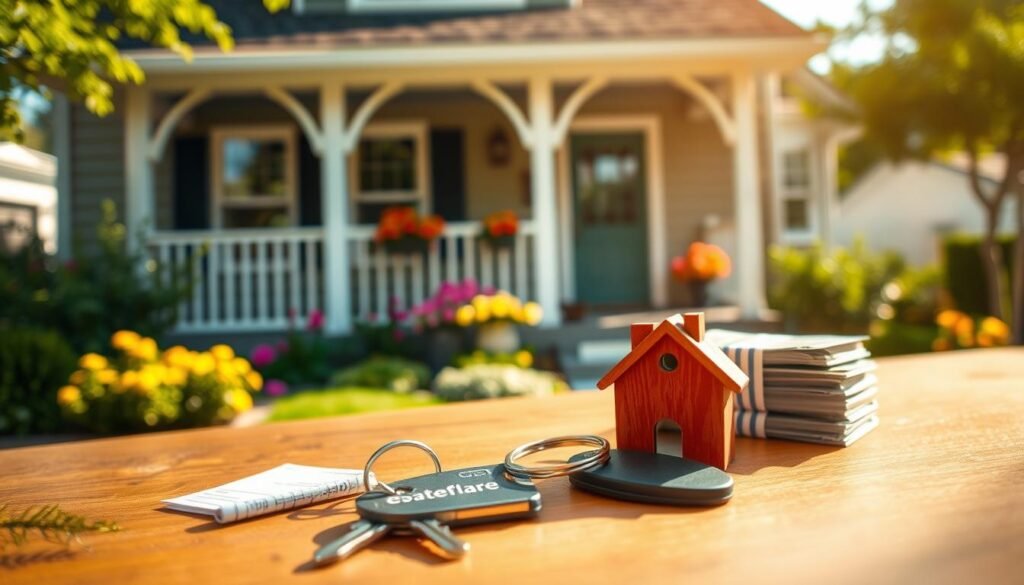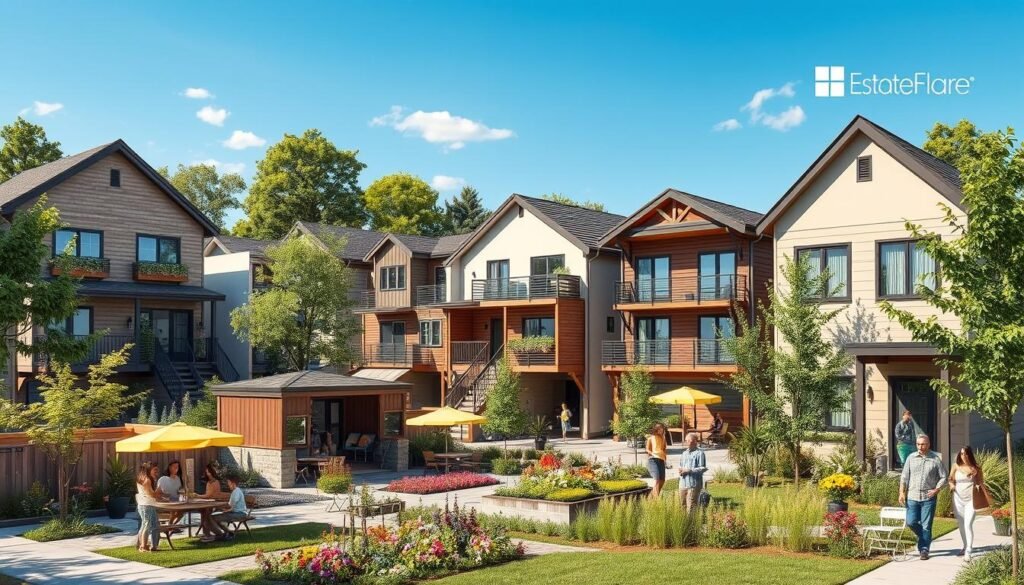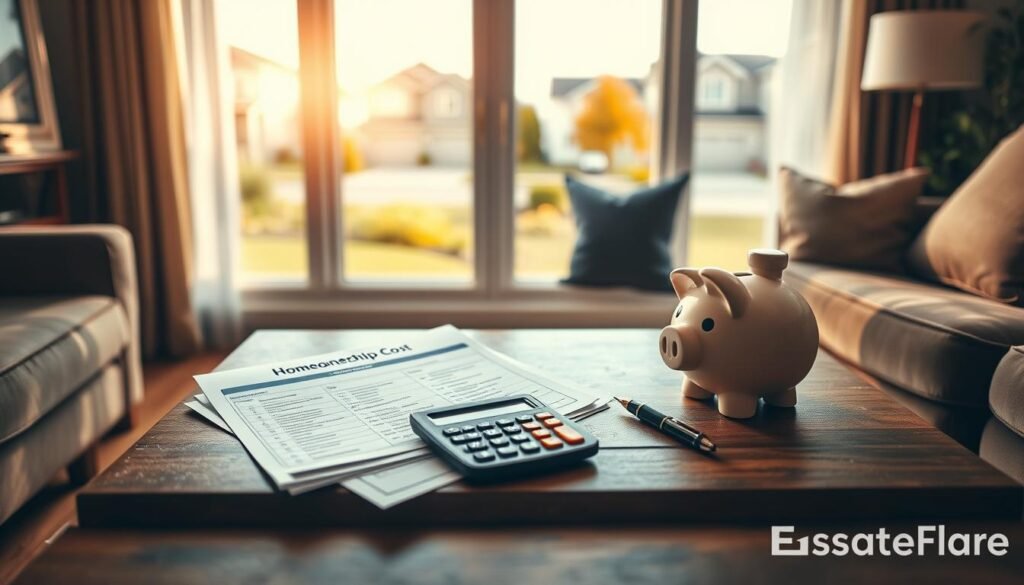In the last ten years, more first-time homebuyers in the U.S. have bought their first home. This shows how appealing homeownership is. We’ll look at the benefits and the financial help available to make owning your first home possible.
Key Takeaways
- Discover the benefits of building equity and gaining tax advantages as a homeowner.
- Learn about specialized homebuyer assistance programs and down payment assistance options.
- Understand the importance of homeownership education courses and affordable housing initiatives.
- Explore government-backed mortgage options and flexible loan requirements for first-time buyers.
- Prepare for the costs of homeownership and take advantage of closing cost credits and tax credits.
Why Buying a First Home is a Smart Investment
Buying your first home is a big step in your financial journey. It can lead to long-term gains. You build wealth as your property value increases. Homeowners also get tax breaks, like deductions for mortgage interest and property taxes. These can help lower the costs of first-time buyer benefits.
Building Equity and Wealth
Every month, a part of your mortgage payment goes towards owning your home. This is called building building equity. As you pay more, you own more of your home. This equity can be used for loans or to sell your home in the future.
Tax Benefits for Homeowners
Homeownership also offers tax perks. You can deduct mortgage interest and property taxes from your income. These tax benefits for homeowners make owning a home more affordable. They are especially helpful for first-time buyers.
Knowing the financial benefits of owning a home helps first-time buyers make smart choices. It sets them on a path to wealth and financial security.
“Buying a home is one of the best ways to build long-term wealth and financial stability. The combination of equity building and tax advantages makes it a smart investment for first-time buyers.”
First-time buyer benefits
Buying a home for the first time is both exciting and challenging. Luckily, first-time buyer benefits make this journey easier and more affordable. These perks include financial help, special mortgages, and learning tools for new homeowners.
One big first-time buyer benefit is down payment help. Many programs offer grants or loans to cover the initial costs. This makes it easier for first-time buyers to get into the market. Also, there are credits and incentives for closing costs, which can save money.
First-time buyers can also get special mortgages with easier terms. These include FHA, VA, and USDA loans, which need lower down payments and are more flexible. Homeownership education courses help new buyers understand the home-buying process.
There are also tax benefits for first-time buyers. For example, the Mortgage Interest Deduction and the First-Time Homebuyer Tax Credit can reduce costs. These incentives help make homeownership more affordable and can increase your wealth over time.
By using the first-time buyer benefits, aspiring homeowners can face fewer financial hurdles. These resources are key in helping make owning a first home a reality.

Navigating the Home Buying Process
Buying a home for the first time is both exciting and challenging. It requires careful planning and knowledge of the steps involved. Knowing about mortgage options for first-time buyers is key.
Understanding Mortgage Options
There are many mortgage options for your first home. You can choose from conventional loans, FHA, VA, and USDA loans, or special programs for first-timers. Each has its own rules, rates, and down payment needs. It’s important to research and compare these to find the best fit for you.
Lenders often help first-time buyers with guidance and resources. They offer pre-approval, loan estimates, and advice tailored to your financial situation. With a good lender, you can feel confident and prepared as you navigate the home buying process.
| Mortgage Option | Eligibility Criteria | Minimum Down Payment | Typical Interest Rate |
|---|---|---|---|
| Conventional Loan | Good credit, stable income | 20% | 3.5% – 5.5% |
| FHA Loan | First-time or low-income buyers | 3.5% | 3.8% – 4.8% |
| VA Loan | Active military or veterans | 0% | 2.8% – 3.8% |
| USDA Loan | Low-income buyers in rural areas | 0% | 3.5% – 4.5% |
By understanding your mortgage options and working with a trusted lender, first-time buyers can confidently navigate the home buying process. They can find a financing solution that fits their needs and budget.
Homebuyer Assistance Programs
First-time homebuyers face many challenges on their journey to owning a home. But, there are government programs to help. These homebuyer assistance programs offer down payment help and closing cost credits. They make buying a home easier.
One big help is down payment assistance. Saving 20% for a down payment is hard. But, government programs can lower this amount. This lets buyers start building equity sooner.
Some homebuyer assistance programs also cover closing costs. Closing costs can be a big expense. But, these credits help reduce this financial burden. This makes buying a home more affordable.
To find the best homebuyer assistance programs, look at federal, state, and local options. These resources can help first-time buyers feel more confident and secure on their path to homeownership.
“Homeownership is a powerful tool for building wealth and financial stability. With the right assistance programs, more Americans can achieve this important milestone.”
In conclusion, homebuyer assistance programs are a big help for first-time buyers. They provide the support needed to overcome financial hurdles and achieve homeownership. By using these resources, buyers can start their journey with more confidence and security.
Down Payment Assistance Options
First-time homebuyers often struggle to save for a down payment. Luckily, there are many down payment assistance programs. These include grants and forgivable loans that can help you buy a home with little or no money down.
Grants and Forgivable Loans
Down payment grants are financial help that you don’t have to pay back. You just need to meet certain requirements and stay in the home for a while. These grants can be a few thousand dollars or even tens of thousands, depending on the program and where you live.
Forgivable loans work like regular loans but the balance is forgiven over time. This happens if you keep owning and living in the home. So, the loan acts like a grant, making it easier to save for a down payment.
| Down Payment Assistance Program | Description | Maximum Assistance |
|---|---|---|
| City of Chicago Down Payment Assistance | Grant program for first-time homebuyers in Chicago | $7,500 |
| Florida Housing Down Payment Assistance | Forgivable loan program for first-time and repeat homebuyers in Florida | $10,000 |
| Texas Statewide Homebuyer Assistance | Grant and forgivable loan options for first-time and repeat homebuyers in Texas | Up to $20,000 |
Using these down payment assistance options, first-time homebuyers can achieve their dream of homeownership. This is with a more manageable financial load.
Closing Cost Credits and Incentives
As a first-time homebuyer, you might get closing cost credits and incentives. These help make buying a home more affordable. They cover fees and expenses, saving you money.
Closing cost credits are common. They come from lenders or sellers. These credits can pay for some or all closing costs. Closing costs usually range from 2% to 5% of the home’s price.
There are also closing cost incentive programs. These are from state and local governments, and non-profits. They offer grants, forgivable loans, or other help for closing costs.
| Closing Cost Credits | Closing Cost Incentives |
|---|---|
|
|
Using closing cost credits and closing cost incentives can lower the cost of buying a home. This makes it easier for first-time buyers to achieve their dream.

“Closing cost assistance programs can be a game-changer for first-time buyers, helping them overcome one of the biggest hurdles to homeownership.”
Tax Credits for First-time Homebuyers
As a first-time homebuyer, you might get tax credits and deductions. These can help a lot with the cost of your new home. They are meant to help people and families buy their first home.
The Mortgage Interest Deduction is a common tax credit. It lets you deduct part of your mortgage interest. This can save you thousands each year. You can also deduct property taxes and some home improvement costs.
Some places have their own tax credits for first-time buyers. These might include a percentage of the home’s price or deductions for closing costs. It’s key to check what’s available in your area to save more.
| Tax Benefit | Description | Potential Savings |
|---|---|---|
| Mortgage Interest Deduction | Allows you to deduct a portion of the interest paid on your mortgage | Thousands of dollars per year |
| Property Tax Deduction | Allows you to deduct the property taxes you pay on your home | Hundreds to thousands of dollars per year |
| State and Local Tax Credits | Specific tax credits and deductions offered by your state or local government | Varies by location |
Using these tax benefits can really help first-time buyers. It can make the big costs of buying a home easier. Always talk to a tax expert or financial advisor to make sure you’re getting all the tax credits for first-time homebuyers you can.
“Homeownership is one of the most effective ways to build wealth and financial security. The tax incentives available to first-time buyers can make a big difference in making that dream a reality.”
Low Mortgage Rates for First-timers
First-time homebuyers can often get lower mortgage rates. This makes owning a home more possible, even with little savings or credit. Lenders help by offering special loans for new buyers.
Flexible Loan Requirements
First-time buyers also get more flexible loan rules. Lenders might overlook small credit issues or accept different proof of payment. This helps those who might not qualify for regular mortgages.
- Reduced down payment requirements, often as low as 3-5% of the home’s value
- Relaxed debt-to-income ratios to accommodate limited credit history or income
- Acceptance of non-traditional income sources, such as self-employment or gig work
By using these flexible rules and low rates, first-time buyers can start their journey to homeownership. They can build wealth over time through their home’s value.

“Homeownership is a key driver of wealth creation, and first-time buyers who leverage low rates and flexible loan terms can get a head start on this important financial milestone.”
Homeownership Education Courses
Starting your journey to homeownership is exciting but can feel overwhelming, especially if it’s your first time. Luckily, homeownership education courses are here to help. They offer valuable information and practical advice to make the transition smoother.
Many homebuyer assistance programs require or encourage first-timers to take these courses. They know how crucial it is to prepare you for the real estate market’s challenges.
These courses cover important topics like:
- Budgeting and financial management
- Understanding credit and credit scores
- Mortgage options and financing
- The home-buying process, from pre-approval to closing
- Selecting the right real estate agent and lender
- Maintaining a home and managing homeownership responsibilities
By taking these courses, first-time buyers get a deep understanding of the homebuying journey. This knowledge helps them make smart choices and might even qualify them for special incentives and help.
Whether online or in-person, homeownership education courses are a great resource for new homeowners. By investing in this education, first-time buyers can have a smoother and more successful home-buying experience.
| Course Provider | Course Format | Course Duration | Cost |
|---|---|---|---|
| HUD-Approved Housing Counseling Agencies | In-person and online | Typically 6-8 hours | Free or low-cost |
| State and Local Homebuyer Education Programs | In-person and online | Varies by program | Free or low-cost |
| Private Mortgage Lenders | Online | Typically 2-4 hours | Free or low-cost |
“Homeownership education courses provide first-time buyers with the knowledge and confidence they need to navigate the complex home-buying process successfully.”
Affordable Housing Initiatives
Starting your journey to homeownership can feel overwhelming, especially if it’s your first time. But, there are many affordable housing programs to help. These programs are offered by local and state governments, as well as non-profit groups. They aim to help low- and moderate-income families own a home.
Income-based Programs
These affordable housing programs focus on income. They consider your financial situation to offer solutions. This includes everything from subsidized housing to special financing options.
For example, some programs help with down payments or closing costs. This is a big help for first-time buyers. Others offer low-interest mortgages or special financing to make monthly payments easier.
| Affordable Housing Initiative | Key Features |
|---|---|
| State Housing Finance Agency Programs | – Down payment and closing cost assistance – Flexible mortgage requirements – Income-based eligibility |
| Community Land Trusts | – Permanently affordable homes – Leasehold ownership model – Income-restricted eligibility |
| Habitat for Humanity | – Sweat equity homebuilding program – Zero-interest mortgage loans – Partner family income requirements |
Using these affordable housing initiatives, first-time buyers can feel more confident. They can successfully navigate the homebuying process. This leads to the rewarding benefits of homeownership.

Government-backed Mortgages
First-time homebuyers might be excited to find out about government-backed mortgage programs. These options make buying a home easier, especially for those with little money or poor credit.
The Federal Housing Administration (FHA) offers a well-liked government-backed mortgage. FHA loans need only a 3.5% down payment. This is great for new buyers. Also, FHA loans are easier to get if your credit score is low.
The Department of Veterans Affairs (VA) loan is another good choice. It’s for military folks, veterans, and their spouses. VA loans don’t require a down payment. This is a big help for those who have served and want to own a home.
The U.S. Department of Agriculture (USDA) also has mortgage programs. They help low- and moderate-income folks in rural areas. These loans often have no down payment and low interest rates. They’re perfect for those looking for affordable homes in the countryside.
| Mortgage Program | Minimum Down Payment | Credit Score Requirements | Eligible Locations |
|---|---|---|---|
| FHA Loan | 3.5% | 580 (or 500 with additional requirements) | Nationwide |
| VA Loan | 0% | No minimum score | Nationwide for eligible military members and veterans |
| USDA Loan | 0% | No minimum score | Rural and suburban areas |
Exploring these government-backed mortgage options opens doors for first-time homebuyers. It’s a big step towards owning a home.
Preparing for Homeownership Costs
Buying your first home is exciting but comes with big financial tasks. You’ll need to pay for the home upfront, like down payments and closing fees. Then, there are ongoing costs like property taxes, insurance, and maintenance.
It’s important to plan your finances well. Knowing what costs come with homeownership helps you avoid surprises. This way, you can enjoy the perks of owning a home.
Budgeting for Ongoing Expenses
Start by making a detailed budget for homeownership costs. Include estimates for property taxes, insurance, maintenance, and utilities. Don’t forget about HOA fees if you live in a community with them.
- Property taxes
- Homeowners insurance
- Routine maintenance (e.g., landscaping, cleaning, repairs)
- Utilities (electricity, gas, water, internet, etc.)
- Homeowners association (HOA) fees, if applicable
With a good budget, you can handle the monthly costs of owning a home.
Building an Emergency Fund
It’s also wise to save for unexpected expenses, like big repairs. Aim to save three to six months’ worth of living costs. This way, you’re ready for any financial surprises.
| Expense | Estimated Monthly Cost |
|---|---|
| Property Taxes | $200 |
| Homeowners Insurance | $100 |
| Maintenance and Repairs | $150 |
| Utilities | $300 |
| HOA Fees | $50 |
| Total Estimated Monthly Expenses | $800 |
By planning for preparing for homeownership costs, first-time buyers can make a smooth transition to home ownership.

SELLING A HOUSE WITHOUT AN AGENT: WHAT RISKS ARE INVOLVED?
Conclusion
Becoming a first-time homebuyer in the United States has many benefits. It also offers a lot of resources to make the process easier and cheaper. By using programs like first-time buyer benefits, you can start building equity and get tax perks. This can help make your dream of owning a home come true.
There are many tools and support systems for first-time buyers. You can find help with down payments, closing costs, and understanding mortgages. By learning and using these options, you can feel confident and prepared for the home buying journey.
Starting your journey to homeownership might have ups and downs. But with the right info and resources, you can face any obstacle. So, get ready to own your dream home. Let the benefits of first-time buyer programs lead the way.



